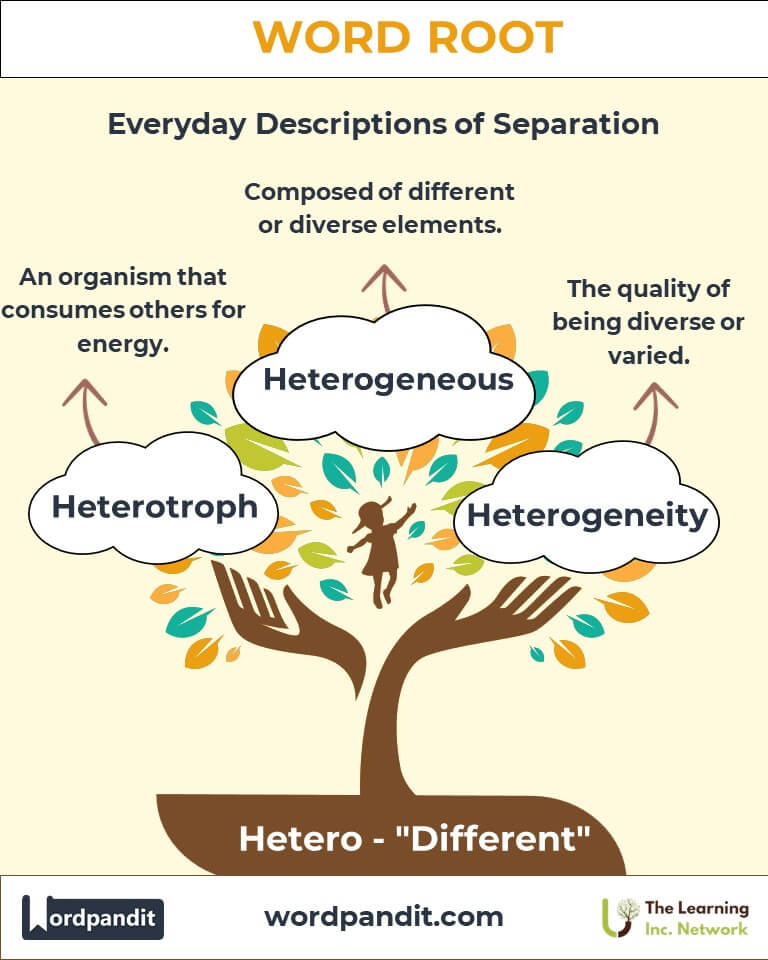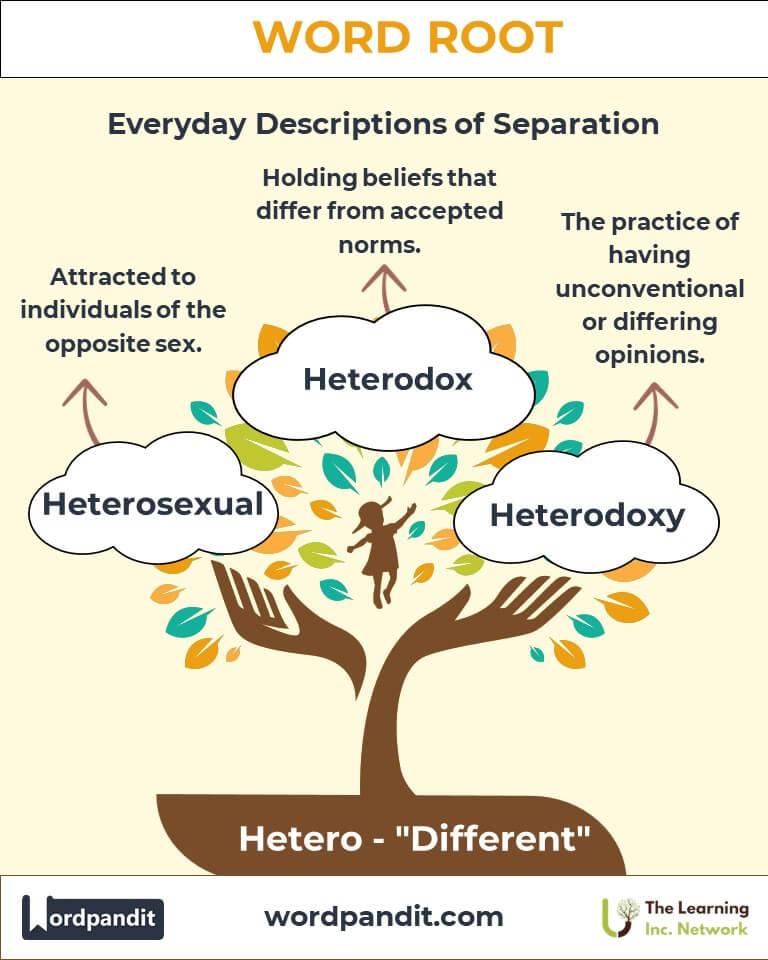Hetero: The Root of Diversity and Contrast in Language
Discover the linguistic significance of the root "hetero," derived from Greek, meaning "different" or "other." From terms like "heterogeneous" to "heterosexual," this root highlights the importance of variety and contrast in our vocabulary and understanding of the world.

Table of Contents
- Introduction: The Essence of "Hetero"
- Etymology and Historical Journey
- Mnemonic: Unlocking the Power of "Hetero"
- Common Hetero-Related Terms
- Hetero Through Time
- Hetero in Specialized Fields
- Illustrative Story: "Hetero" in Action
- Cultural Significance of "Hetero"
- The "Hetero" Family Tree
- FAQs about the "Hetero" Word Root
- Test Your Knowledge: "Hetero" Mastery Quiz
- Conclusion: The Living Legacy of "Hetero"
Introduction: The Essence of "Hetero"
Diversity and contrast are fundamental to understanding the world around us, and the word root "hetero" captures this essence perfectly. Pronounced heh-teh-roh, it comes from the Greek word heteros, meaning "different" or "other." The root has inspired a rich array of terms across disciplines, from science to sociology, emphasizing variety and the coexistence of contrasts.

Etymology and Historical Journey
The journey of "hetero" begins in ancient Greece, where heteros was used to describe something "different" or "of another kind." As Greek influenced Latin and later English, "hetero" became a prefix in countless terms to signify diversity or contrast. Over centuries, words like heterogeneous (used in natural sciences) and heterosexual (in social and biological contexts) emerged, shaping modern language and thought.
Mnemonic: Unlocking the Power of "Hetero"
Picture a multicolored quilt made up of various patterns and textures. Each patch represents something "different" or "other," coming together to form a beautiful whole. Think of this quilt as "hetero"—a celebration of diversity.
Mnemonic Device:
"Hetero is the prefix of contrasts, where diversity meets unity."
Common Hetero-Related Terms
-
Heterogeneous (heh-teh-roh-JEE-nee-us)
Meaning: Composed of parts or elements that are different.
Example: "The soup was a heterogeneous mix of vegetables, meats, and spices." -
Heterosexual (heh-teh-roh-SEK-shoo-uhl)
Meaning: Attracted to individuals of the opposite sex.
Example: "The concept of heterosexual relationships has been a key focus in societal norms." -
Heterodox (heh-teh-roh-doks)
Meaning: Holding beliefs or opinions that are different from the accepted norms.
Example: "Her heterodox ideas challenged traditional thinking in the field of philosophy." -
Heterotroph (heh-teh-roh-trof)
Meaning: An organism that consumes other organisms for energy.
Example: "Humans, as heterotrophs, rely on plants and animals for sustenance." -
Heterogeneity (heh-teh-roh-JEH-nee-uh-tee)
Meaning: The quality or state of being diverse or varied.
Example: "The city is celebrated for its cultural heterogeneity."
Hetero Through Time
Heterogeneous: Originally used in 17th-century natural sciences, this term described mixtures of distinct substances. Its usage expanded to cultural, social, and economic contexts, signifying diversity in every sphere.
Heterodox: In early theological debates, "heterodox" was used to describe individuals with beliefs differing from established doctrines. It now applies broadly to unconventional ideas in any field.
Hetero in Specialized Fields
- Biology:
- Heterotroph: Describes organisms that depend on others for energy, forming a critical part of ecological systems.
- Medicine:
- Heterogeneous diseases: Conditions caused by diverse factors, highlighting the need for varied treatment approaches.
- Sociology:
- Heterogeneity: Used to discuss cultural and societal diversity.
Illustrative Story: "Hetero" in Action
Sophia was tasked with creating a project on community diversity. As she interviewed people from different backgrounds, she noticed the beauty of heterogeneity in her neighborhood—different cuisines, languages, and traditions blending into a vibrant tapestry. Her project, aptly titled Hetero Harmony, won first prize for showcasing the richness of contrasts in human society.
Cultural Significance of "Hetero"
The concept of "hetero" resonates across cultures, symbolizing the coexistence of differences. From advocating for inclusivity in societal contexts to emphasizing biodiversity in ecological studies, "hetero" remains a powerful reminder of the value in variety.

The "Hetero" Family Tree
- Homo- (same):
- Homogeneous: Composed of similar elements.
- Homophone: Words that sound the same but have different meanings.
- Poly- (many):
- Polyglot: A person who speaks multiple languages.
- Polymath: A person with knowledge across many fields.
- Iso- (equal):
- Isometric: Having equal dimensions.
- Isobar: Lines of equal pressure.

FAQs About Hetero
Q: What does "hetero" mean?
A: The root "hetero" originates from the Greek word heteros, meaning "different" or "other." It is used in words to signify diversity, contrast, or things that are not alike, such as "heterogeneous" or "heterotroph."
Q: What is the difference between "heterogeneous" and "homogeneous"?
A: "Heterogeneous" refers to a composition of different or varied components (e.g., a mixed salad). In contrast, "homogeneous" describes a uniform composition where all parts are alike (e.g., a glass of milk).
Q: How is "hetero" used in biology?
A: In biology, "hetero" appears in terms like "heterotroph," which describes organisms that obtain energy by consuming others, unlike autotrophs that produce their own energy through processes like photosynthesis.
Q: What does "heterodoxy" mean in modern usage?
A: "Heterodoxy" refers to beliefs or opinions that differ from the accepted or orthodox views. While it originally applied to religious doctrines, it now broadly describes unconventional ideas in fields like science, politics, or philosophy.
Q: What is the significance of "heterogeneity" in sociology?
A: In sociology, "heterogeneity" refers to diversity or variety within a group, community, or population. For example, a heterogeneous society might include people of different ethnicities, languages, or cultural traditions.
Test Your Knowledge: Hetero Mastery Quiz
1. What does "hetero" mean?
2. Which term describes an organism that consumes others for energy?
3. What does "heterodoxy" refer to?
4. What does "heterogeneous" mean?
5. Which of the following is an example of heterogeneity?
Conclusion: The Living Legacy of "Hetero"
The root "hetero" encapsulates the beauty of difference, diversity, and contrast. Its presence in language reflects humanity's ability to celebrate variety, whether in science, culture, or society. As the world grows increasingly interconnected, "hetero" serves as a linguistic reminder of the strength and richness that comes from embracing "the other."












